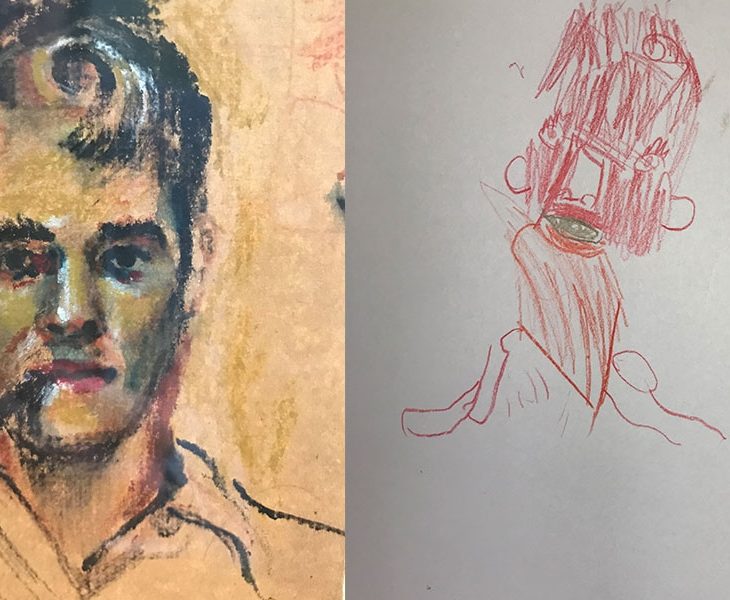Memorial – We Are the Stories We Tell
May 22, 2020

My paternal grandfather, Walter Hartman, was an artist. I know of him only through stories; he died a few weeks before my parents’ wedding. But the stories that we tell shape our world and I have cherished these stories that connect generations.
In World War II my grandfather was among the soldiers who scouted out ahead of the rest of the troop, sketching and taking pictures of the terrain that the soldiers could expect to encounter as they advanced. Grandpa Hartman was part of the liberating force at Dachau, charged with depicting the depravity they found in that concentration camp, and the life that remained, a picture of genocide alongside humanity’s persistence to survive.
When he returned home to north central Pennsylvania, the war followed him, as it does for many. And of course, as Rabbi Heschel said, no man is an island. No one carries the mantle alone. My father, who himself loved to camp in the woods around his house as a child, recalls that his father wasn’t interested in camping – he had spent enough time in tents, he said. My grandmother, Margie Shafer Hartman, addressing one of the demons of war, decided that hers would be a dry house. No alcohol, no smoking – Walter would have to get rid of that pipe in his portrait.
Part of my family lore is the story of America as a refuge. Several generations back my ancestors fled religious persecution in Germany and settled in north central Pennsylvania, seeking religious freedom. We’re American Baptist, a small protestant denomination with a practical theology anchored in the interdependence of freedom and diversity. I grew up explaining it this way – I may not believe what you believe, but I will fight for your right to believe it, for when your voice is silenced, my voice is also silenced.
The interplay between expressing one’s individual identity and respecting diversity, between the freedom to make choices and the responsibility one has to the good of the whole, are woven into my family’s story and the American story. The cost of war is great, born by the families and communities and generations following those who serve. For me it is worth upholding the ideals of freedom and mutual responsibility, even as we have yet to achieve those ideals as a nation.
As we honor Memorial Day amidst Covid-19, I am grateful to all of those who are working toward the common good in this moment. Some are risking their very lives, with reverberations for their families and generations to come. Some are scouting ahead, telling the stories of what they see, inviting others into the most intimate of spaces so that we might better understand the true cost of this crisis. The stories we hear and retell about ourselves as families, communities, and a nation, will shape our vision and subsequently our future.
My children both love art. They love to draw and paint, to sing and to dance. They pass by their Great Grandpa Hartman’s self-portrait every morning as they head to the kitchen for oatmeal. Nora, nearly 5, recently sketched her own picture of Walter Hartman while her little brother napped. She is most proud of the hair swirl. The little things matter.
I tell my children stories of their Great Grandpa Hartman and remind them that the best way to honor those who have died is to embody their love, to live in ways that emulate their best qualities, and tell the stories that remind us to be brave and kind.
Share
Related Articles
American Civic Life
We Commemorate, We Commit: Out of Catastrophe, a Conversation on Connection and Repair
American Civic Life
American Civic Life
The Interfaith Legacy of Muhammad Ali: “The Wise Man Changes”



